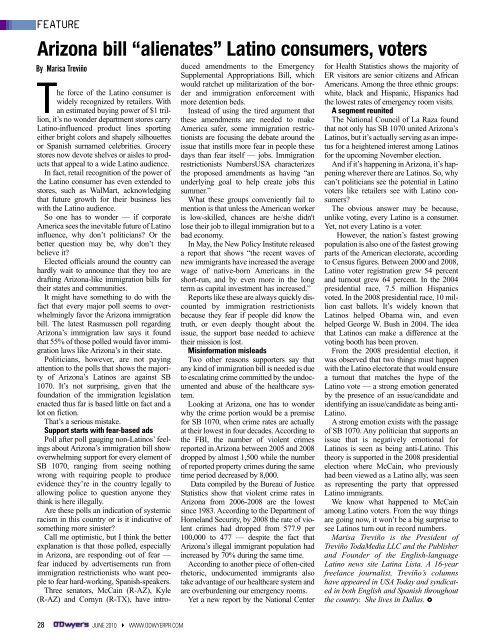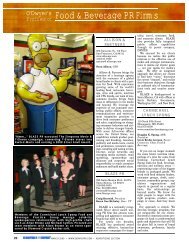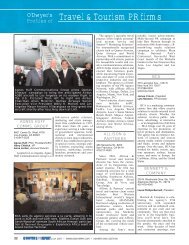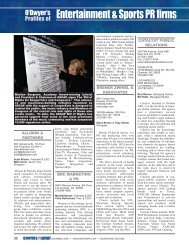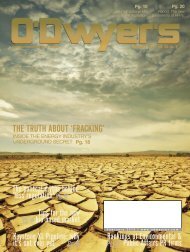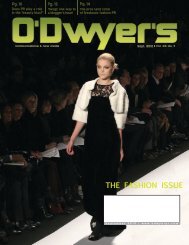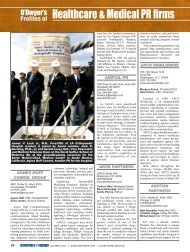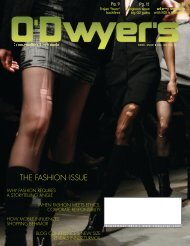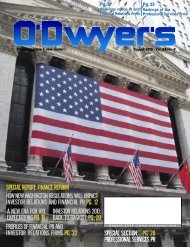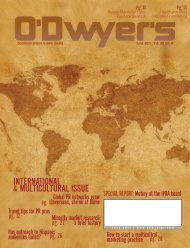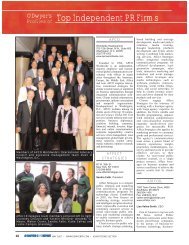multicultural pr special report - Odwyerpr.com
multicultural pr special report - Odwyerpr.com
multicultural pr special report - Odwyerpr.com
- No tags were found...
You also want an ePaper? Increase the reach of your titles
YUMPU automatically turns print PDFs into web optimized ePapers that Google loves.
FEATUREArizona bill “alienates” Latino consumers, votersBy Marisa TreviñoThe force of the Latino consumer iswidely recognized by retailers. Withan estimated buying power of $1 trillion,it’s no wonder department stores carryLatino-influenced <strong>pr</strong>oduct lines sportingeither bright colors and shapely silhouettesor Spanish surnamed celebrities. Grocerystores now devote shelves or aisles to <strong>pr</strong>oductsthat appeal to a wide Latino audience.In fact, retail recognition of the power ofthe Latino consumer has even extended tostores, such as WalMart, acknowledgingthat future growth for their business lieswith the Latino audience.So one has to wonder — if corporateAmerica sees the inevitable future of Latinoinfluence, why don’t politicians? Or thebetter question may be, why don’t theybelieve it?Elected officials around the country canhardly wait to announce that they too aredrafting Arizona-like immigration bills fortheir states and <strong>com</strong>munities.It might have something to do with thefact that every major poll seems to overwhelminglyfavor the Arizona immigrationbill. The latest Rasmussen poll regardingArizona’s immigration law says it foundthat 55% of those polled would favor immigrationlaws like Arizona’s in their state.Politicians, however, are not payingattention to the polls that shows the majorityof Arizona’s Latinos are against SB1070. It’s not sur<strong>pr</strong>ising, given that thefoundation of the immigration legislationenacted thus far is based little on fact and alot on fiction.That’s a serious mistake.Support starts with fear-based adsPoll after poll gauging non-Latinos’ feelingsabout Arizona’s immigration bill showoverwhelming support for every element ofSB 1070, ranging from seeing nothingwrong with requiring people to <strong>pr</strong>oduceevidence they’re in the country legally toallowing police to question anyone theythink is here illegally.Are these polls an indication of systemicracism in this country or is it indicative ofsomething more sinister?Call me optimistic, but I think the betterexplanation is that those polled, e<strong>special</strong>lyin Arizona, are responding out of fear —fear induced by advertisements run fromimmigration restrictionists who want peopleto fear hard-working, Spanish-speakers.Three senators, McCain (R-AZ), Kyle(R-AZ) and Cornyn (R-TX), have introducedamendments to the EmergencySupplemental Ap<strong>pr</strong>o<strong>pr</strong>iations Bill, whichwould ratchet up militarization of the borderand immigration enforcement withmore detention beds.Instead of using the tired argument thatthese amendments are needed to makeAmerica safer, some immigration restrictionistsare focusing the debate around theissue that instills more fear in people thesedays than fear itself — jobs. Immigrationrestrictionists NumbersUSA characterizesthe <strong>pr</strong>oposed amendments as having “anunderlying goal to help create jobs thissummer.”What these groups conveniently fail tomention is that unless the American workeris low-skilled, chances are he/she didn'tlose their job to illegal immigration but to abad economy.In May, the New Policy Institute releaseda <strong>report</strong> that shows “the recent waves ofnew immigrants have increased the averagewage of native-born Americans in theshort-run, and by even more in the longterm as capital investment has increased.”Reports like these are always quickly discountedby immigration restrictionistsbecause they fear if people did know thetruth, or even deeply thought about theissue, the support base needed to achievetheir mission is lost.Misinformation misleadsTwo other reasons supporters say thatany kind of immigration bill is needed is dueto escalating crime <strong>com</strong>mitted by the undocumentedand abuse of the healthcare system.Looking at Arizona, one has to wonderwhy the crime portion would be a <strong>pr</strong>emisefor SB 1070, when crime rates are actuallyat their lowest in four decades. According tothe FBI, the number of violent crimes<strong>report</strong>ed in Arizona between 2005 and 2008dropped by almost 1,500 while the numberof <strong>report</strong>ed <strong>pr</strong>operty crimes during the sametime period decreased by 8,000.Data <strong>com</strong>piled by the Bureau of JusticeStatistics show that violent crime rates inArizona from 2006-2008 are the lowestsince 1983. According to the Department ofHomeland Security, by 2008 the rate of violentcrimes had dropped from 577.9 per100,000 to 477 — despite the fact thatArizona’s illegal immigrant population hadincreased by 70% during the same time.According to another piece of often-citedrhetoric, undocumented immigrants alsotake advantage of our healthcare system andare overburdening our emergency rooms.Yet a new <strong>report</strong> by the National Centerfor Health Statistics shows the majority ofER visitors are senior citizens and AfricanAmericans. Among the three ethnic groups:white, black and Hispanic, Hispanics hadthe lowest rates of emergency room visits.A segment reunitedThe National Council of La Raza foundthat not only has SB 1070 united Arizona’sLatinos, but it’s actually serving as an impetusfor a heightened interest among Latinosfor the up<strong>com</strong>ing November election.And if it’s happening in Arizona, it’s happeningwherever there are Latinos. So, whycan’t politicians see the potential in Latinovoters like retailers see with Latino consumers?The obvious answer may be because,unlike voting, every Latino is a consumer.Yet, not every Latino is a voter.However, the nation’s fastest growingpopulation is also one of the fastest growingparts of the American electorate, accordingto Census figures. Between 2000 and 2008,Latino voter registration grew 54 percentand turnout grew 64 percent. In the 2004<strong>pr</strong>esidential race, 7.5 million Hispanicsvoted. In the 2008 <strong>pr</strong>esidential race, 10 millioncast ballots. It’s widely known thatLatinos helped Obama win, and evenhelped George W. Bush in 2004. The ideathat Latinos can make a difference at thevoting booth has been <strong>pr</strong>oven.From the 2008 <strong>pr</strong>esidential election, itwas observed that two things must happenwith the Latino electorate that would ensurea turnout that matches the hype of theLatino vote — a strong emotion generatedby the <strong>pr</strong>esence of an issue/candidate andidentifying an issue/candidate as being anti-Latino.A strong emotion exists with the passageof SB 1070. Any politician that supports anissue that is negatively emotional forLatinos is seen as being anti-Latino. Thistheory is supported in the 2008 <strong>pr</strong>esidentialelection where McCain, who <strong>pr</strong>eviouslyhad been viewed as a Latino ally, was seenas re<strong>pr</strong>esenting the party that op<strong>pr</strong>essedLatino immigrants.We know what happened to McCainamong Latino voters. From the way thingsare going now, it won’t be a big sur<strong>pr</strong>ise tosee Latinos turn out in record numbers.Marisa Treviño is the President ofTreviño TodaMedia LLC and the Publisherand Founder of the English-languageLatino news site Latina Lista. A 16-yearfreelance journalist, Treviño’s columnshave appeared in USA Today and syndicatedin both English and Spanish throughoutthe country. She lives in Dallas. 28JUNE 2010 WWW.ODWYERPR.COM


